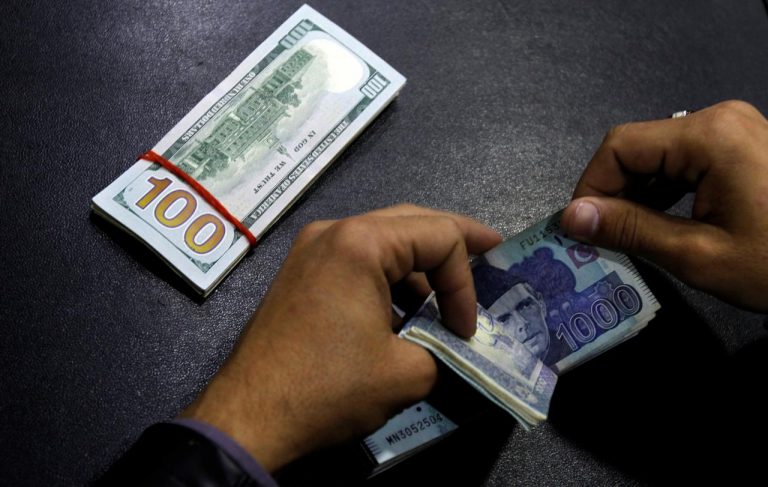
LAHORE: The rupee on Monday plunged to Rs129.5 against the greenback in the kerb market, as the continuing uncertainty on the economic and political front batter’s currency and capital markets.
The rupee nosedived by Rs2.10 against the dollar in the open market, as the currency dealers refused to exchange the greenback in Karachi, according to media reports.
However, the inter-bank market rate of the rupee to a dollar stood at Rs124.27 according to SBP’s market to market revaluation rate sheet.
Consequently, as the supply of dollars dries up in the open market, it will push up demand creating a dearth of the greenback and rupee is expected to nosedive further.
A report published by World Bank on Sunday said despite a modest rebound recently, there was a 10 percent depreciation compared to the beginning of the year and a 14 percent depreciation compared to one year before.
According to Adnan Sheikh, Pak Kuwait Investment Co AVP Research this was expected since, during the IMF talks, the State Bank of Pakistan (SBP) itself acknowledged depreciation of the rupee to Rs135-137 levels against the dollar during FY19.
He added, “People have been rushing to buy dollars in the open market today since it is the only guaranteed investment for a Pakistani that will have a positive return.”
In a comment to Profit, Samiullah Tariq Arif Habib Limited’s Head of Research said, “I believe people have started hoarding dollars, in anticipation of the looming depreciation of the rupee.”
He added, “As media reports suggest Pakistan is heading for an IMF bailout, where conditions include rupee depreciation and higher interest rates.”
Mr Tariq elaborated that the government and the IMF both are making efforts to reduce the country’s reliance on external financing, where the primary problem is the high current account deficit.
Moreover, he explained increasing the value of rupee against the greenback will reduce its demand and increase supply.
However, Express Tribune last week reported IMF and Pakistan disagreed over the exchange rate parity, as the State Bank of Pakistan (SBP) believed the exchange rate of Rs137 to a US dollar by end of the current financial year 2018-19 would be enough to address the challenges.
According to sources, IMF’s determination was to the contrary and they wanted the rupee to be traded above Rs145 to a dollar.
Pakistan has been facing a crisis on the external front, with burgeoning trade & current account deficits and depleting foreign exchange reserves.
Pakistan’s gross external financing requirement has been estimated at $22-25 billion for the current financial year FY19.
Also, adding to the worries was the $628 million decline in foreign exchange reserves of the central bank last week to $8.4 billion, which was the sharpest fall in years leaving the country with import cover of barely 1.5 months.
The panic and pandemonium have also rattled the capital markets, as the KSE-100 index plummeted 1328.06 points to over a two-year low of 37,989.29 points (-3.39 percent) on Monday.
On 29th May 2017, the market capitalization of PSX stood at $99 billion and now it is $66 billion, a fall of $33 billion in the last sixteen months.
The International Monetary Fund had issued a statement on Friday calling Pakistan for more exchange rate facility and monetary policy tightening alongside further fiscal adjustment to help in decreasing current account pressures and improve debt sustainability.
However, on Sunday Prime Minister Imran Khan in Lahore told reporters “We may go to IMF for a loan to handle the country’s financial issues.”
“But, first we will try to get assistance from other countries as we have requested three countries to deposit money in Pakistan’s State Bank that would help boost national reserves,” said Khan.
Also, Finance Minister Asad Umar has stated Pakistan foreign exchange reserves need to be boosted by $8 billion, but after the July election, no emergency assistance has been extended forth by close allies China and Saudi Arabia.
https:///2018/10/05/pakistan-confronted-by-difficult-economic-situation-imf/






























